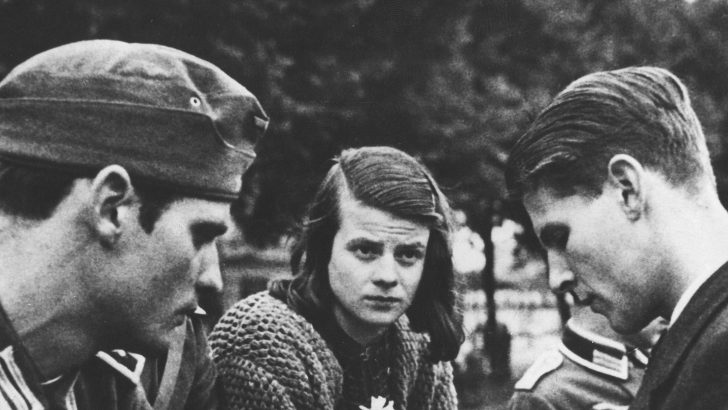The Notebook
Fr Conor McDonough
Among the noble efforts to resist the Nazi regime was that of Sophie Scholl and the other members of Munich’s ‘White Rose’ group. This small group of friends printed and distributed thousands of copies of anti-Nazi leaflets, even, with incredible courage, throwing huge bundles of them down the staircase between lectures at the University of Munich.
These leaflets were an eloquent appeal to the consciences of the German people: “Why do the German people behave so apathetically in the face of all these crimes, so unworthy of the human race? […] The German people slumber on in their dull, stupid sleep.”
If the conscience of Germany was asleep, Sophie and her co-conspirators were there to wake it up: “We will not be silent. We are your guilty conscience. The White Rose will not leave you in peace!”
It is easy to romanticise these resistance movements, and to imagine that those who defy corrupt and unjust regimes always feel like heroes, as if their every action is done with certainty and panache, but Sophie Scholl was a 12-year-old girl when Hitler became chancellor of Germany. Later, when considering resistance, she had no political leaders to look up to, no obvious movements to join. All the important institutions, all the sage professors and clever journalists, all the self-appointed voices of reason and authority were lined up behind the Führer.
Resistance meant living in fear and isolation, risking humiliation, and renouncing the right to a quiet life. This is what the White Rose group were choosing when, after much prayer, reading, and conversation, these friends began to form a tiny but tough knot of resistance which shook the Nazi machine for almost a year.
Dehumanisation
Germany has long since woken up to the crimes of the Nazis, but in the meantime nearly the whole world has fallen into a deep sleep concerning the dehumanisation and widespread termination of our unborn brothers and sisters. Many of the great global institutions and voices of authority are now lined up behind the idea that the right to life of the unborn child is an enemy of progress.
In the face of this global machine Ireland is currently part of the counter-movement which claims that the rights of mother and child ought to be, in all cases, protected by law. And in the face of current threats to the Eighth Amendment the pro-life movement, in all its manifestations, is a tough knot of resistance.
I have come across so many people who have recently found the courage to become active in this resistance movement, people who have been quietly living the culture of life for years as parents, as carers, as volunteers and community workers. Now they are knocking on doors, handing out leaflets, sporting slogans on jumpers and badges, debating with respect and resolution, and untiringly questioning the logic of abortion.
Sophie Scholl was executed by guillotine on February 22, 1943, at the age of 22. Her last recorded words are worth imprinting on our conscience: “How can we expect righteousness to prevail when there is hardly anyone willing to give himself up individually to a righteous cause? Such a fine, sunny day, and I have to go, but what does my death matter if, through us, thousands of people are awakened and stirred to action?”
Among priests I’ve heard a lot of debate about how best to address the issue of abortion in the run-up to the referendum, with some unsure about whether and how to preach on the topic. I have little wisdom to offer on that point, but there is an enormous amount that priests can do, apart from the homily, to energise and activate their parishioners. We can find out which parishioners are already active in this area, and encourage them. We can individually invite others to join them. We can make sure that reading material is available in the back of the church – from the bishops’ conference, from the Love Both campaign, from the Life Institute, and so on. And we can invite members of our congregations who have real doubts on this issue to come and talk them over with us. Our parishes are sleeping lions – let’s wake them up!


 (l-r) White Rose members Hans Scholl, Sophie Scholl, and Chirstoph Probst in Munich, 1942. All three were executed on February 22, 1943.
(l-r) White Rose members Hans Scholl, Sophie Scholl, and Chirstoph Probst in Munich, 1942. All three were executed on February 22, 1943. 